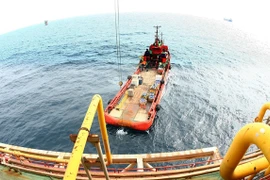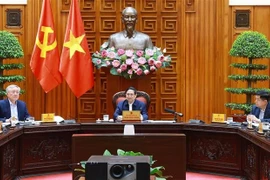Hanoi (VNA) - The streamlining of the state management apparatus is creating pressure for state-owned enterprises (SOEs) to "transform themselves" in order to improve operational efficiency, quickly adopt advanced governance standards, and move towards international standards.
This move not only improves the efficiency of state management but also opens up significant opportunities for businesses, as they no longer have to struggle with tangled procedures. This will enable them to quickly implement projects and seize business opportunities in a timely manner.
Currently, in Vietnam, there are more than 670 SOEs, with about two-thirds wholly owned by the state. In the remaining ones, the state holds more than 50% of the charter capital.
SOEs play an important role in providing public goods and services, generating jobs, limiting the control of private and foreign entities over the economy, creating public funds, and improving access to public services.
In terms of economic role, although they account for a very small percentage in the total number of enterprises, they contribute a significant source of revenue to the national budget. Specifically, SOEs make up only 0.3% of all businesses in Vietnam but hold nearly 4 quadrillion VND (156.4 billion USD) in total assets, and own 20.5% of the capital in the entire business sector. They generate a pre-tax profit of 348.3 trillion VND (accounting for 23.9%), contribute nearly 366 trillion VND to the state budget, and represent nearly 30% of the national GDP.
To address the shortcomings of the market mechanism and the limitations of the private sector within certain boundaries, state-owned enterprises play a crucial role in providing public goods. Given their unique characteristics, public goods, if left to be produced and supplied solely by the private sector under market principles, would likely fall into shortage, resulting in monopolies.
They take on strategic production and business sectors that are vital for socio-economic development and require significant investment, beyond the capacity of the private sector.
In addition, they participate in new sectors with high risk factors, demonstrating their role in paving the way and leading the economy, and promoting the application of science and technology.
Regarding political role, SOEs are one of the important macro tools of the state, playing a guiding role in the development of the socialist-oriented economy. They act as the core, pioneering and guiding force (rather than the dominant force) to ensure the economic foundation for national security, maintain social stability, and fulfill the political tasks assigned by the state.
In terms of social role, state-owned enterprises contribute to the nation’s social welfare goals by employing a large workforce, creating jobs, and increasing income. They help reduce social inequality, contribute to poverty alleviation, and ensure the provision of essential public services in remote areas where private enterprises are unlikely to invest.
In the new era of the nation's rise, SOEs need to demonstrate their role as trailblazers in the economy, and be the pioneering and leading force in innovation, transforming governance models, restructuring capital, and reorganising production and supply chains.
The apparatus streamlining and mechanism reform are expected to hold great significance to the position of state-owned enterprises in the current context. The management over these businesses will be decentralised, with more autonomy and authority granted to them, in order to enhance their proactivity and creativity.
Directive No. 09/CT-TTg, signed by Prime Minister Pham Minh Chinh on March 21, 2025, stresses that to continue leading the economy, SOEs need to continue strengthening their dominant and central role in essential sectors and industries of the economy, while also acting as important tools to maintain macroeconomic stability.
In his March 9 official dispatch on some key tasks and solutions to cut down administrative procedures, improve the business environment, and promote socio-economic development, the Prime Minister requested extra efforts to reduce administrative procedure processing time and business costs (compliance costs) by at least 30%, while also abolishing 30% of unnecessary business conditions./.
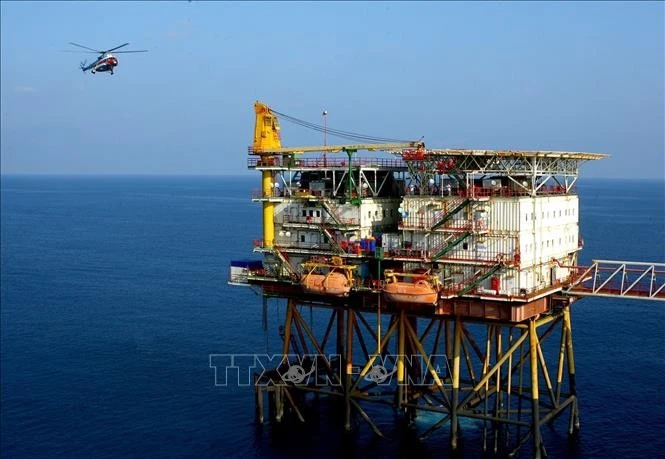
See more

Vietnam Airlines launches direct service to world’s largest airport in China
Vietnam Airlines plans to open and resume 15 international flight routes in 2025, continuing to expand its flight network to countries such as Italy, Denmark, the Middle East, Russia, and China
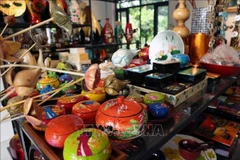
Hanoi boosts economy through craft village development
Hanoi is implementing various initiatives to develop local craft villages.
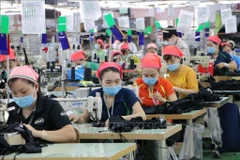
Vietnam’s garment-textile industry stitching a greener, smarter future
Supported by 17 next-generation free trade agreements (FTAs) already in effect, the industry is poised for further growth, targeting 48 billion USD in export revenue this year.

First charter flight from Iran lands in Hanoi, boosting tourism ties
Charter flights offer a swift, direct connection between the two nations, unlocking potential for broader cooperation in aviation, trade, culture, and education.

PM urges completion of North-South expressways by year-end
Chairing a meeting between permanent Government members and inspection teams for expressways nationwide in Hanoi on March 29, PM Chinh, who is also head of the State Steering Committee for Key Transport Projects, stressed that achieving a growth rate of at least 8% in 2025 and double-digit growth thereafter hinges on public investment.

Vietnam develops roadmap for establishing international financial centre
Speaking at a conference on creating a financial centre in Vietnam on March 28, Minister of Finance Nguyen Van Thang said Vietnam is “on the brink of a golden opportunity” to establish itself as a key player in the global financial arena.
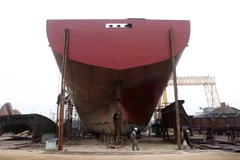
Ample room to float Vietnam’s shipbuilding industry
As domestic and global demand for new ships continues to rise, Vietnam's shipbuilding industry has significant potential for growth.
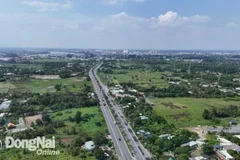
Dong Nai approves planning for 3 billion USD urban area project
Located along the Dong Nai River, the 293-hectare Hiep Hoa Urban Area project in Bien Hoa city, Dong Nai province will feature a new urban complex with a low population density, modern infrastructure, and a harmony with nature. The development will also focus on sustainable tourism, offering a mix of residential areas, commercial-service housing for tourism, ecological villas, and public services.

Vietnam, South Africa eye stronger air logistics links
While South Africa’s aviation logistics sector plays a crucial role in its economy, Vietnam still has significant potential for development, particularly in air freight.
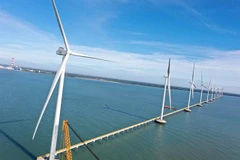
Tra Vinh approves investment policy for five more wind power projects
The Tra Vinh provincial People’s Committee has given the green light to the investment policy for five wind power projects, for an investment total of over 13.8 trillion VND.
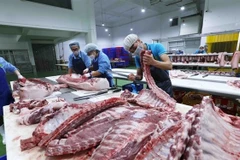
Deputy PM requests investigation into record high pork prices
Pork prices reach as high as 80,000 VND (3.14 USD) per kilogramme in some localities, which is the highest level in the last five years.

Dong Nai holds dialogue with FDI enterprises to ease difficulties
At the event, businesses raised concerns related to value-added tax refunds, increased land rental costs, reduced LNG supply, labour shortages, the issuance of construction ownership certificates, and environmental hygiene and traffic safety on roads within industrial zones.
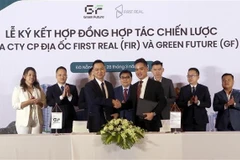
Green Future powers green tourism in Da Nang with 1,000 electric vehicle lease
Under the deal, GF will initially deliver 300 VinFast EVs to First Real to jointly advance sustainable tourism, providing visitors with eco-friendly and convenient transportation options. The remainder will be handed over within this year.

Binh Dinh approves 62 investment projects worth over 9 billion USD
With a sound investment climate, Binh Dinh has become an attractive destination for investors, positioning itself as one of the most dynamic economic hubs in the country, and a leading development province in the region.
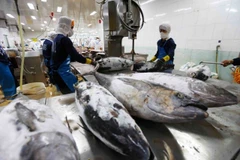
Tuna exports hit record high but face major regulatory barriers
Statistics from Vietnam Customs show that the value of tuna exports in February reached nearly 73 million USD, which marks a 41% increase on-year and the highest level for the same period over the past five years.

Viettel’s new member aims to exploit customer service market
Viettel Customer Service is a technology company focused on customer services, offering end-to-end solutions including consulting, design, software development, and human resources.
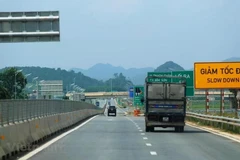
Over 6.2 billion USD needed for expanding North-South expressway
The Ministry of Construction has proposed expanding the 1,144-km eastern wing of North-South expressway from Hanoi to Ho Chi Minh City from four to six lanes, at an estimated cost of 152.1 trillion VND (around 6.2 billion USD).
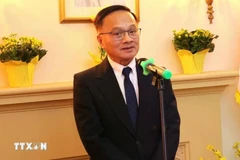
Vietnam-Canada Business Association expands operation
The establishment of the Eastern Chapter not only marks a significant step in the Vietnam-Canada Business Association's growth but also addresses the rising demand for networking and collaboration among Vietnamese and Canadian entrepreneurs in the region.
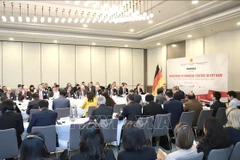
Int’l financial centre ensures Vietnam’s sustainable financial growth: Experts
Financial experts expressed their willingness to share knowledge, expertise, and support Vietnam’s access to vital capital, while as assisting Vietnam in training and recruitment of highly skilled financial professionals to ensure the swift and effective development of the financial centres. Additionally, they committed to connecting Vietnamese businesses with German and international investors.
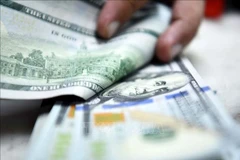
Reference exchange rate falls 3 VND on March 28
The State Bank of Vietnam set the daily reference exchange rate for the US dollar at 24,843 VND/USD on March 28, down 3 VND from the previous day’s morning.

